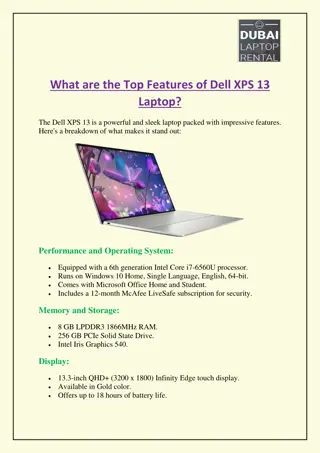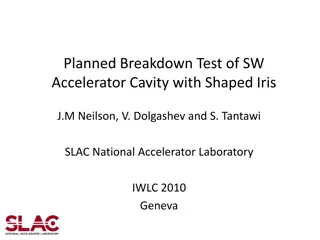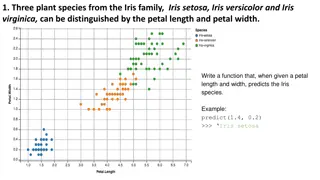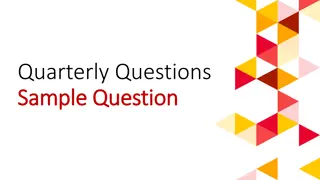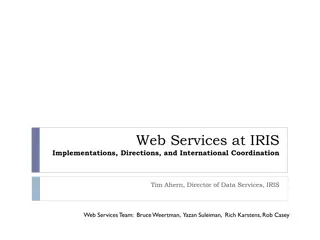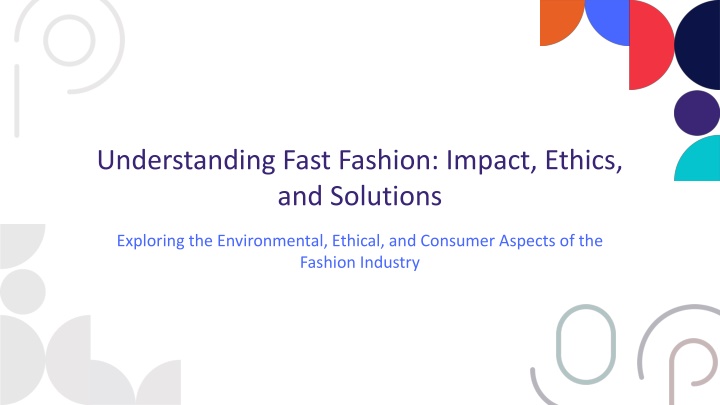
Understanding Fast Fashion: Impact, Ethics, and Solutions in the Fashion Industry
Explore the environmental, ethical, and consumer aspects of fast fashion in the industry. Learn about the rise of fast fashion, its environmental impact, ethical concerns, consumer behavior, sustainable alternatives, industry practices, and more. Empower yourself with knowledge to make informed and conscious choices towards a sustainable fashion industry.
Download Presentation

Please find below an Image/Link to download the presentation.
The content on the website is provided AS IS for your information and personal use only. It may not be sold, licensed, or shared on other websites without obtaining consent from the author. If you encounter any issues during the download, it is possible that the publisher has removed the file from their server.
You are allowed to download the files provided on this website for personal or commercial use, subject to the condition that they are used lawfully. All files are the property of their respective owners.
The content on the website is provided AS IS for your information and personal use only. It may not be sold, licensed, or shared on other websites without obtaining consent from the author.
E N D
Presentation Transcript
Understanding Fast Fashion: Impact, Ethics, and Solutions Exploring the Environmental, Ethical, and Consumer Aspects of the Fashion Industry
Table of contents Lesson Introduction 01 Subject Knowledge: The Rise of Fast Fashion 02 Subject Knowledge: Environmental Impact 03 Subject Knowledge: Ethical Concerns 04 Subject Knowledge: Consumer Behavior 05 Subject Knowledge: Sustainable Alternatives 06 Subject Knowledge: Industry Practices 07 Subject Knowledge: Call to Action 08 Subject Knowledge: Case Studies 09 Conclusion 10
Lesson Introduction Understanding the Ethical Dilemma Dilemma Empowering Conscious Consumers Promoting Informed Choices Fast fashion presents a complex By the end of this lesson, participants This lesson aims to empower ethical dilemma, balancing consumer will be equipped to make more learners with the knowledge and 02 01 03 demand for affordable, trendy informed choices as conscious and critical thinking skills needed to clothing with the industry's consumers, contributing to a more needed to navigate the ethical environmental and social impacts. sustainable fashion industry. challenges of fast fashion. Understanding Fast Fashion: Impact, Ethics, and Solutions
Subject Knowledge: The Rise of Fast Fashion The Rise of Fast Fashion Textile Waste Environmental Impact This business model has led to a significant increase in textile waste, with garments often being worn only a few times before being discarded. The fast fashion industry is a major contributor to environmental degradation, from the use of harmful chemicals in textile production to the carbon footprint of transportation and waste disposal. Fast fashion refers to the rapid production and consumption of clothing, driven by the constant demand for new styles and trends. Understanding Fast Fashion: Impact, Ethics, and Solutions
Subject Knowledge: Environmental Impact Environmental Impact The Rise of Fast Fashion Fast fashion industry: major contributor to environmental degradation. Fast fashion: rapid production and consumption of of clothing driven by demand for new styles. Use of harmful chemicals in textile production. Result: significant increase in textile waste, garments often worn only a few times before disposal. Statistics: X% increase in textile waste over the past decade. Understanding Fast Fashion: Impact, Ethics, and Solutions
Subject Knowledge: Ethical Concerns Environmental Impact The Rise of Fast Fashion The fast fashion industry is a major contributor to environmental degradation, from the use of harmful chemicals in textile production to the massive carbon footprint generated by transportation and manufacturing processes. Fast fashion refers to the rapid production and consumption of clothing, driven by the constant demand for new styles and trends. This business model has led to a significant increase in textile waste, with garments often being worn only a few times before being discarded. Labor Exploitation Lack of Transparency Impact on Local Communities One of the key ethical concerns in fast fashion is the lack of transparency in the supply chain. Many fast fashion brands outsource production to to countries with lax labor laws, leading to poor working working conditions, low wages, and exploitation of of workers, including child labor in some cases. The rapid pace of fast fashion production can have have detrimental effects on local communities, from from pollution of water sources due to textile dyeing dyeing processes to displacement of traditional artisans artisans and small-scale producers. Consumers often have little to no information about where and how their clothes are made, making it difficult to assess the ethical practices of brands. Understanding Fast Fashion: Impact, Ethics, and Solutions
Subject Knowledge: Consumer Behavior Consumer Trends Psychological Factors Consumers are increasingly seeking transparency and transparency and sustainability in the fashion industry. industry. Impulse buying and the fear of missing out (FOMO) (FOMO) drive fast fashion purchases. The desire for instant gratification and the thrill of getting a good deal impact consumer behavior. The rise of social media influencers has influenced purchasing decisions and promoted fast fashion culture. Consumer Trends Psychological Factors Consumers are increasingly seeking transparency and sustainability in the fashion industry. Impulse buying and the fear of missing out (FOMO) (FOMO) drive fast fashion purchases. The rise of social media influencers has influenced purchasing decisions and promoted fast fashion culture. The desire for instant gratification and the thrill of getting a good deal impact consumer behavior. Understanding Fast Fashion: Impact, Ethics, and Solutions
Subject Knowledge: Sustainable Alternatives Slow Fashion Movement Upcycling and Repurposing Support brands that prioritize quality over quantity Embrace creativity by transforming old or unused unused clothing into new pieces Produce timeless pieces with sustainable materials Reduce the need for new purchases Ethical manufacturing practices Divert textiles from landfills Rental and Second-Hand Platforms Sustainable Fabrics Local and Ethical Brands Explore renting clothes for special occasions Opt for clothing made from eco-friendly materials like organic cotton, hemp, or recycled polyester Support local designers and brands Shop from thrift stores Prioritize fair wages, safe working conditions, and transparency throughout the supply chain Minimize environmental impact Extend the lifecycle of garments Promote a circular economy Reduce overall consumption Understanding Fast Fashion: Impact, Ethics, and Solutions
Subject Knowledge: Industry Practices The Rise of Fast Fashion and unsafe conditions Rapid production and consumption of clothing Supply Chain Transparency Driven by constant demand for new styles and trends Lack of transparency in supply chains Significant increase in textile waste Difficult for consumers to trace origins of clothing Environmental Impact Challenges in understanding production conditions Major contributor to environmental degradation Sustainable Alternatives Use of harmful chemicals in textile production Rising demand for sustainable and ethical alternatives Massive carbon footprint from transportation and Eco-friendly materials and fair trade practices manufacturing Transparent supply chains Labor Practices Emphasis on low costs leads to exploitative labor practices Workers in developing countries face long hours, low wages, Understanding Fast Fashion: Impact, Ethics, and Solutions
Subject Knowledge: Call to Action Extend the Lifespan Lifespan of Your Clothes Support Ethical Brands Shop Mindfully Educate Yourself Advocate for Change Use your voice to advocate Choose to support brands Instead of constantly Take the time to research Before making a purchase, for transparency and brands that prioritize buying new items, focus on and understand the impact consider the true cost of the accountability in the fashion ethical and sustainable focus on caring for and of fast fashion on the 05 03 04 02 01 item beyond its price tag. industry. practices in their repairing the clothes you environment and society. Think about the resources production processes. you already own. Support initiatives that Stay informed about the used, the labor involved, promote fair wages, safe latest developments in Look for certifications like This simple act can and the potential impact on working conditions, and sustainable fashion Fair Trade or organic significantly reduce textile the planet and people. environmental practices. materials. waste. sustainability. Understanding Fast Fashion: Impact, Ethics, and Solutions
Subject Knowledge: Case Studies Consequences of Fast Fashion Environmental Impact Introduction to Fast Fashion Major contributor to environmental Rapid production and consumption Significant increase in textile waste 01 03 02 degradation consumption waste Use of harmful chemicals in textile Driven by demand for new styles Garments worn only a few times production Understanding Fast Fashion: Impact, Ethics, and Solutions
Conclusion Environmental Concerns Conscious Consumerism Fast Fashion's Impact Collective Effort Stay Informed Rapid production and Advocate for positive and consumption lead Opt for sustainable and change in the fashion lead to excessive textile ethical fashion choices. Together, we can industry. 05 02 03 04 01 Extensive use of textile waste. make a difference in Support brands with harmful chemicals in Embrace quality over the fashion industry's transparency, fair labor Short garment lifespans textile production. quantity for a ethical landscape. contribute to practices, and eco- sustainable environmental friendly methods. wardrobe. degradation. Understanding Fast Fashion: Impact, Ethics, and Solutions




